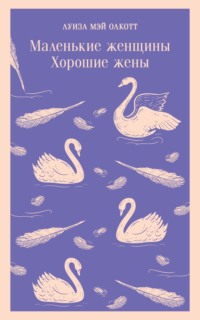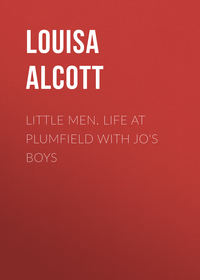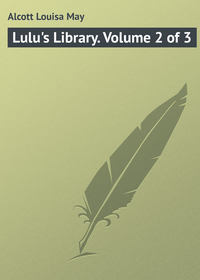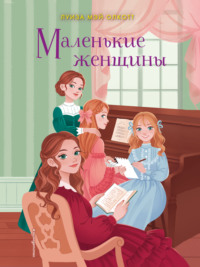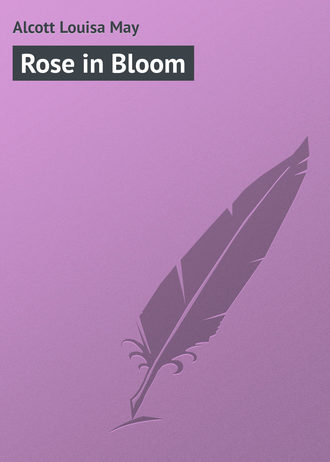 полная версия
полная версияRose in Bloom
"How many letters in five days?"
"Four, sir, to me: she doesn't write to him, uncle."
"As yet. Well, you show hers: so it's all right; and you are a set of sentimental youngsters." And the doctor walked away, looking as if he enjoyed the sentiment as much as any of them.
Old Miss Campbell was nearly as great a favorite as young Miss Campbell; so a succession of black coats and white gloves flowed in and out of the hospitable mansion pretty steadily all day. The clan were out in great force, and came by instalments to pay their duty to Aunt Plenty, and wish the compliments of the season to "our cousin." Archie appeared first, looking sad but steadfast, and went away with Phebe's letter in his left breast-pocket; feeling that life was still endurable, though his love was torn from him: for Rose had many comfortable things to say, and read him delicious bits from the voluminous correspondence lately begun.
Hardly was he gone, when Will and Geordie came marching in, looking as fine as gray uniforms with much scarlet piping could make them, and feeling peculiarly important, as this was their first essay in New-Year's call-making. Brief was their stay, for they planned to visit every friend they had; and Rose could not help laughing at the droll mixture of manly dignity and boyish delight with which they drove off in their own carriage, both as erect as ramrods, arms folded, and caps stuck at exactly the same angle on each blonde head.
"Here comes the other couple, – Steve, in full feather, with a big bouquet for Kitty; and poor Mac, looking like a gentleman and feeling like a martyr, I'm sure," said Rose, watching one carriage turn in as the other turned out of the great gate, with its arch of holly, ivy, and evergreen.
"Here he is: I've got him in tow for the day, and want you to cheer him up with a word of praise; for he came without a struggle, though planning to bolt somewhere with uncle," cried Steve, falling back to display his brother, who came in, looking remarkably well in his state and festival array; for polishing began to tell.
"A happy New Year, aunty; same to you, cousin, and best wishes for as many more as you deserve," said Mac, heeding Steve no more than if he had been a fly, as he gave the old lady a hearty kiss, and offered Rose a quaint little nosegay of pansies.
"Heart's-ease: do you think I need it?" she asked, looking up with sudden sobriety.
"We all do. Could I give you any thing better on a day like this?"
"No: thank you very much," and a sudden dew came to Rose's eyes; for, though often blunt in speech, when Mac did do a tender thing, it always touched her; because he seemed to understand her moods so well.
"Has Archie been here? He said he shouldn't go anywhere else; but I hope you talked that nonsense out of his head," said Steve, settling his tie before the mirror.
"Yes, dear, he came; but looked so out of spirits, I really felt reproached. Rose cheered him up a little: but I don't believe he will feel equal to making calls, and I hope he won't; for his face tells the whole story much too plainly," answered Aunt Plenty, rustling about her bountiful table in her richest black silk, with all her old lace on.
"Oh, he'll get over it in a month or two, and Phebe will soon find another lover; so don't be worried about him, aunty," said Steve, with the air of a man who knew all about that sort of thing.
"If Archie does forget, I shall despise him; and I know Phebe won't try to find another lover, though she'll probably have them: she is so sweet and good!" cried Rose, indignantly; for, having taken the pair under her protection, she defended them valiantly.
"Then you'd have Arch hope against hope, and never give up, would you?" asked Mac, putting on his glasses to survey the thin boots which were his especial abomination.
"Yes, I would! for a lover is not worth having if he's not in earnest."
"Exactly: so you'd like them to wait and work and keep on loving till they made you relent, or plainly proved that it was no use."
"If they were good as well as constant, I think I should relent in time."
"I'll mention that to Pemberton; for he seemed to be hit the hardest, and a ray of hope will do him good, whether he is equal to the ten years' wait or not," put in Steve, who liked to rally Rose about her lovers.
"I'll never forgive you if you say a word to any one. It is only Mac's odd way of asking questions, and I ought not to answer them. You will talk about such things, and I can't stop you; but I don't like it," said Rose, much annoyed.
"Poor little Penelope! she shall not be teased about her suitors, but left in peace till her Ulysses comes home," said Mac, sitting down to read the mottoes sticking out of certain fanciful bonbons on the table.
"It is this fuss about Archie which has demoralized us all. Even the owl waked up, and hasn't got over the excitement yet, you see. He's had no experience, poor fellow; so he doesn't know how to behave," observed Steve, regarding his bouquet with tender interest.
"That's true; and I asked for information, because I may be in love myself some day, and all this will be useful, don't you see?"
"You in love!" and Steve could not restrain a laugh at the idea of the bookworm a slave to the tender passion.
Quite unruffled, Mac leaned his chin in both hands, regarding them with a meditative eye, and he answered in his whimsical way, —
"Why not? I intend to study love as well as medicine; for it is one of the most mysterious and remarkable diseases that afflict mankind, and the best way to understand it is to have it. I may catch it some day, and then I should like to know how to treat and cure it."
"If you take it as badly as you did measles and hooping-cough, it will go hard with you, old fellow," said Steve, much amused with the fancy.
"I want it to: no great experience comes or goes easily; and this is the greatest we can know, I believe, except death."
Something in Mac's quiet tone and thoughtful eyes made Rose look at him in surprise; for she had never heard him speak in that way before. Steve also stared for an instant, equally amazed; then said below his breath, with an air of mock anxiety, —
"He's been catching something at the hospital, typhoid probably, and is beginning to wander. I'll take him quietly away before he gets any wilder. Come, old lunatic, we must be off."
"Don't be alarmed: I'm all right and much obliged for your advice; for I fancy I shall be a desperate lover when my time comes, if it ever does. You don't think it impossible, do you?" and Mac put the question so soberly that there was a general smile.
"Certainly not: you'll be a regular Douglas, tender and true," answered Rose, wondering what queer question would come next.
"Thank you. The fact is, I've been with Archie so much in his trouble lately that I've got interested in this matter, and very naturally want to investigate the subject as every rational man must, sooner or later: that's all. Now, Steve, I'm ready," and Mac got up as if the lesson was over.
"My dear, that boy is either a fool or a genius, and I'm sure I should be glad to know which," said Aunt Plenty, putting her bonbons to rights with a puzzled shake of her best cap.
"Time will show; but I incline to think that he is not a fool by any means," answered the girl, pulling a cluster of white roses out of her bosom to make room for the pansies, though they did not suit the blue gown half so well.
Just then Aunt Jessie came in to help them receive, with Jamie to make himself generally useful; which he proceeded to do by hovering round the table like a fly about a honey-pot, when not flattening his nose against the window-panes, to announce excitedly, "Here's another man coming up the drive!"
Charlie arrived next, in his most sunshiny humor; for any thing social and festive was his delight, and when in this mood the Prince was quite irresistible. He brought a pretty bracelet for Rose, and was graciously allowed to put it on, while she chid him gently for his extravagance.
"I am only following your example; for, you know, 'nothing is too good for those we love, and giving away is the best thing one can do,'" he retorted, quoting words of her own.
"I wish you would follow my example in some other things as well as you do in this," said Rose, soberly, as Aunt Plenty called him to come and see if the punch was right.
"Must conform to the customs of society. Aunty's heart would be broken, if we did not drink her health in the good old fashion. But don't be alarmed: I've a strong head of my own, and that's lucky; for I shall need it before I get through," laughed Charlie, showing a long list, as he turned away to gratify the old lady with all sorts of merry and affectionate compliments as the glasses touched.
Rose did feel rather alarmed; for, if he drank the health of all the owners of those names, she felt sure that Charlie would need a very strong head indeed. It was hard to say any thing, then and there, without seeming disrespect to Aunt Plenty: yet she longed to remind her cousin of the example she tried to set him in this respect; for Rose never touched wine, and the boys knew it. She was thoughtfully turning the bracelet with its pretty device of turquoise forget-me-nots, when the giver came back to her, still bubbling over with good spirits.
"Dear little saint, you look as if you'd like to smash all the punch-bowls in the city, and save us jolly young fellows from to-morrow's headache."
"I should; for such headaches sometimes end in heartaches, I'm afraid. Dear Charlie, don't be angry; but you know better than I that this is a dangerous day for such as you: so do be careful for my sake," she added, with an unwonted touch of tenderness in her voice; for, looking at the gallant figure before her, it was impossible to repress the womanly longing to keep it always as brave and blithe as now.
Charlie saw that new softness in the eyes that never looked unkindly on him, fancied that it meant more than it did, and, with a sudden fervor in his own voice, answered quickly, —
"My darling, I will!"
The glow which had risen to his face was reflected in hers; for at that moment it seemed as if it would be possible to love this cousin, who was so willing to be led by her, and so much needed some helpful influence to make a noble man of him. The thought came and went like a flash; but gave her a quick heart-throb, as if the old affection was trembling on the verge of some warmer sentiment, and left her with a sense of responsibility never felt before. Obeying the impulse, she said, with a pretty blending of earnestness and playfulness, —
"If I wear the bracelet to remember you by, you must wear this to remind you of your promise."
"And you," whispered Charlie, bending his head to kiss the hands that put a little white rose in his button-hole.
Just at that most interesting moment, they became aware of an arrival in the front drawing-room, whither Aunt Plenty had discreetly retired. Rose felt grateful for the interruption; because, not being at all sure of the state of her heart as yet, she was afraid of letting a sudden impulse lead her too far. But Charlie, conscious that a very propitious instant had been spoilt, regarded the newcomer with any thing but a benignant expression of countenance; and whispering, "Good-by, my Rose, I shall look in this evening to see how you are after the fatigues of the day," he went away, with such a cool nod to poor Fun See that the amiable Asiatic thought he must have mortally offended him.
Rose had little leisure to analyze the new emotions of which she was conscious: for Mr. Tokio came up at once to make his compliments with a comical mingling of Chinese courtesy and American awkwardness; and before he had got his hat on Jamie shouted with admiring energy, —
"Here's another! Oh, such a swell!"
They now came thick and fast for many hours; and the ladies stood bravely at their posts till late into the evening. Then Aunt Jessie went home, escorted by a very sleepy little son, and Aunt Plenty retired to bed used up. Dr. Alec had returned in good season; for his friends were not fashionable ones: but Aunt Myra had sent up for him in hot haste, and he had good-naturedly obeyed the summons. In fact, he was quite used to them now; for Mrs. Myra, having tried a variety of dangerous diseases, had finally decided upon heart-complaint as the one most likely to keep her friends in a chronic state of anxiety, and was continually sending word that she was dying. One gets used to palpitations as well as every thing else; so the doctor felt no alarm, but always went, and prescribed some harmless remedy with the most amiable sobriety and patience.
Rose was tired, but not sleepy, and wanted to think over several things; so instead of going to bed she sat down before the open fire in the study to wait for her uncle, and perhaps Charlie, though she did not expect him so late.
Aunt Myra's palpitations must have been unusually severe; for the clock struck twelve before Dr. Alec came, and Rose was preparing to end her reverie, when the sound of some one fumbling at the hall-door made her jump up, saying to herself, —
"Poor man! his hands are so cold he can't get his latch-key in. Is that you, uncle?" she added, running to admit him; for Jane was slow, and the night as bitter as it was brilliant.
A voice answered "Yes," and as the door swung open in walked, – not Dr. Alec, but Charlie, who immediately took one of the hall chairs, and sat there with his hat on, rubbing his gloveless hands, and blinking as if the light dazzled him, as he said in a rapid, abrupt sort of tone, —
"I told you I'd come – left the fellows keeping it up gloriously – going to see the old year out, you know. But I promised – never break my word – and here I am. Angel in blue, did you slay your thousands?"
"Hush! the waiters are still about: come to the study fire and warm yourself; you must be frozen," said Rose, going before to roll up the easy-chair.
"Not at all – never warmer – looks very comfortable, though. Where's uncle?" asked Charlie, following with his hat still on, his hands in his pockets, and his eye fixed steadily on the bright head in front of him.
"Aunt Myra sent for him, and I was waiting up to see how she was," answered Rose, busily mending the fire.
Charlie laughed, and sat down upon a corner of the library table. "Poor old soul! what a pity she doesn't die before he is quite worn out. A little too much ether some of these times would send her off quite comfortably, you know."
"Don't speak in that way. Uncle says imaginary troubles are often as hard to bear as real ones," said Rose, turning round displeased.
Till now she had not fairly looked at him; for recollections of the morning made her a little shy. His attitude and appearance surprised her as much as his words, and the quick change in her face seemed to remind him of his manners. Getting up, he hastily took off his hat, and stood looking at her with a curiously fixed yet absent look, as he said in the same rapid, abrupt way, as if, when once started, he found it hard to stop, —
"I beg pardon – only joking – very bad taste I know, and won't do it again. The heat of the room makes me a little dizzy, and I think I got a chill coming out. It is cold – I am frozen, I dare say – though I drove like the devil."
"Not that bad horse of yours, I hope? I know it is dangerous, so late and alone," said Rose, shrinking behind the big chair, as Charlie approached the fire, carefully avoiding a footstool in his way.
"Danger is exciting – that's why I like it. No man ever called me a coward – let him try it once. I never give in – and that horse shall not conquer me. I'll break his neck, if he breaks my spirit doing it. No – I don't mean that – never mind – it's all right," and Charlie laughed in a way that troubled her, because there was no mirth in it.
"Have you had a pleasant day?" asked Rose, looking at him intently, as he stood pondering over the cigar and match which he held, as if doubtful which to strike and which to smoke.
"Day? oh, yes, capital. About two thousand calls, and a nice little supper at the Club. Randal can't sing any more than a crow; but I left him with a glass of champagne upside-down trying to give them my old favorite, —
"''Tis better to laugh than be sighing;'"and Charlie burst forth in that bacchanalian melody at the top of his voice, waving an allumette-holder over his head to represent Randal's inverted wine-glass.
"Hush! you'll wake aunty," cried Rose, in a tone so commanding that he broke off in the middle of a roulade to stare at her with a blank look, as he said apologetically, —
"I was merely showing how it should be done. Don't be angry, dearest – look at me as you did this morning, and I'll swear never to sing another note if you say so. I'm only a little gay – we drank your health handsomely, and they all congratulated me. Told 'em it wasn't out yet. Stop, though – I didn't mean to mention that. No matter – I'm always in a scrape; but you always forgive me in the sweetest way. Do it now, and don't be angry, little darling;" and, dropping the vase, he went toward her with a sudden excitement that made her shrink behind the chair.
She was not angry, but shocked and frightened; for she knew now what the matter was, and grew so pale he saw it, and asked pardon before she could utter a rebuke.
"We'll talk of that to-morrow: it is very late; go home, now, please, before uncle comes," she said, trying to speak naturally; yet betraying her distress by the tremor of her voice, and the sad anxiety in her eyes.
"Yes, yes, I will go – you are tired – I'll make it all right to-morrow;" and, as if the sound of his uncle's name steadied him for an instant, Charlie made for the door with an unevenness of gait which would have told the shameful truth, if his words had not already done so. Before he reached it, however, the sound of wheels arrested him; and, leaning against the wall, he listened with a look of dismay mingled with amusement creeping over his face. "Brutus has bolted – now I am in a fix. Can't walk home with this horrid dizziness in my head. It's the cold, Rose, nothing else, I do assure you; and a chill – yes, a chill. See here! let one of those fellows there lend me an arm – no use to go after that brute. Won't mother be frightened though, when he gets home?" and with that empty laugh again, he fumbled for the door-handle.
"No, no: don't let them see you! don't let any one know! Stay here till uncle comes, and he'll take care of you. O Charlie! how could you do it! how could you when you promised?" and, forgetting fear in the sudden sense of shame and anguish that came over her, Rose ran to him, caught his hand from the lock, and turned the key; then, as if she could not bear to see him standing there with that vacant smile upon his lips, she dropped into a chair and covered up her face.
The cry, the act, and more than all, the sight of the bowed head would have sobered poor Charlie, if it had not been too late. He looked about the room, with a vague, despairing look, as if to find the reason fast slipping from his control: but heat and cold, excitement and reckless pledging of many healths, had done their work too well to make instant sobriety possible; and owning his defeat with a groan, he turned away and threw himself face-downward on the sofa; one of the saddest sights the new year looked upon as it came in.
As she sat there with hidden eyes, Rose felt that something dear to her was dead for ever. The ideal, which all women cherish, look for, and too often think they have found when love glorifies a mortal man, is hard to give up, especially when it comes in the likeness of the first lover who touches a young girl's heart. Rose had just begun to feel that perhaps this cousin, despite his faults, might yet become the hero that he sometimes looked; and the thought that she might be his inspiration was growing sweet to her, although she had not entertained it until very lately. Alas, how short the tender dream had been, how rude the awakening! how impossible it would be ever again to surround that fallen figure with all the romance of an innocent fancy, or gift it with the high attributes beloved by a noble nature!
Breathing heavily in the sudden sleep that kindly brought a brief oblivion of himself, he lay with flushed cheeks, disordered hair, and at his feet the little rose, that never would be fresh and fair again, – a pitiful contrast now to the brave, blithe young man who went so gayly out that morning to be so ignominiously overthrown at night.
Many girls would have made light of a trespass so readily forgiven by the world; but Rose had not yet learned to offer temptation with a smile, and shut her eyes to the weakness that makes a man a brute. It always grieved or disgusted her to see it in others, and now it was very terrible to have it brought so near, – not in its worst form, by any means, but bad enough to wring her heart with shame and sorrow, and fill her mind with dark forebodings for the future. So she could only sit mourning for the Charlie that might have been, while watching the Charlie that was, with an ache at her heart which found no relief till, putting her hands there as if to ease the pain, they touched the pansies, faded, but still showing gold among the sombre purple; and then two great tears dropped on them as she sighed, —
"Ah me! I do need heart's-ease sooner than I thought!"
Her uncle's step made her spring up and unlock the door, showing him such an altered face that he stopped short, ejaculating in dismay, —
"Good heavens, child! what's the matter?" adding, as she pointed to the sofa in pathetic silence, "Is he hurt? – ill? – dead?"
"No, uncle: he is – " She could not utter the ugly word, but whispered, with a sob in her throat, "Be kind to him," and fled away to her own room, feeling as if a great disgrace had fallen on the house.
CHAPTER X.
THE SAD AND SOBER PART
"How will he look? what will he say? can any thing make us forget and be happy again?" were the first questions Rose asked herself as soon as she woke from the brief sleep which followed a long, sad vigil. It seemed as if the whole world must be changed, because a trouble darkened it for her. She was too young yet to know how possible it is to forgive much greater sins than this, forget far heavier disappointments, outlive higher hopes, and bury loves compared to which hers was but a girlish fancy. She wished it had not been so bright a day, wondered how her birds could sing with such shrill gayety, put no ribbon in her hair, and said, as she looked at the reflection of her own tired face in the glass, —
"Poor thing! you thought the new leaf would have something pleasant on it. The story has been very sweet and easy to read so far, but the sad and sober part is coming now."
A tap at the door reminded her that, in spite of her afflictions, breakfast must be eaten; and the sudden thought that Charlie might still be in the house made her hurry to the door, to find Dr. Alec waiting for her with his morning smile. She drew him in, and whispered anxiously, as if some one lay dangerously ill near by, —
"Is he better, uncle? Tell me all about it: I can bear it now."
Some men would have smiled at her innocent distress, and told her this was only what was to be expected and endured; but Dr. Alec believed in the pure instincts that make youth beautiful, desired to keep them true, and hoped his girl would never learn to look unmoved by pain and pity upon any human being vanquished by a vice, no matter how trivial it seemed, how venial it was held. So his face grew grave, though his voice was cheerful as he answered, —
"All right, I dare say, by this time; for sleep is the best medicine in such cases. I took him home last night, and no one knows he came but you and I."
"No one ever shall. How did you do it, uncle?"
"Just slipped out of the long study-window, and got him cannily off; for the air and motion, after a dash of cold water, brought him round, and he was glad to be safely landed at home. His rooms are below, you know: so no one was disturbed, and I left him sleeping nicely."
"Thank you so much," sighed Rose. "And Brutus? weren't they frightened when he got back alone?"
"Not at all: the sagacious beast went quietly to the stable, and the sleepy groom asked no questions; for Charlie often sends the horse round by himself when it is late or stormy. Rest easy, dear: no eye but ours saw the poor lad come and go, and we'll forgive it for love's sake."



